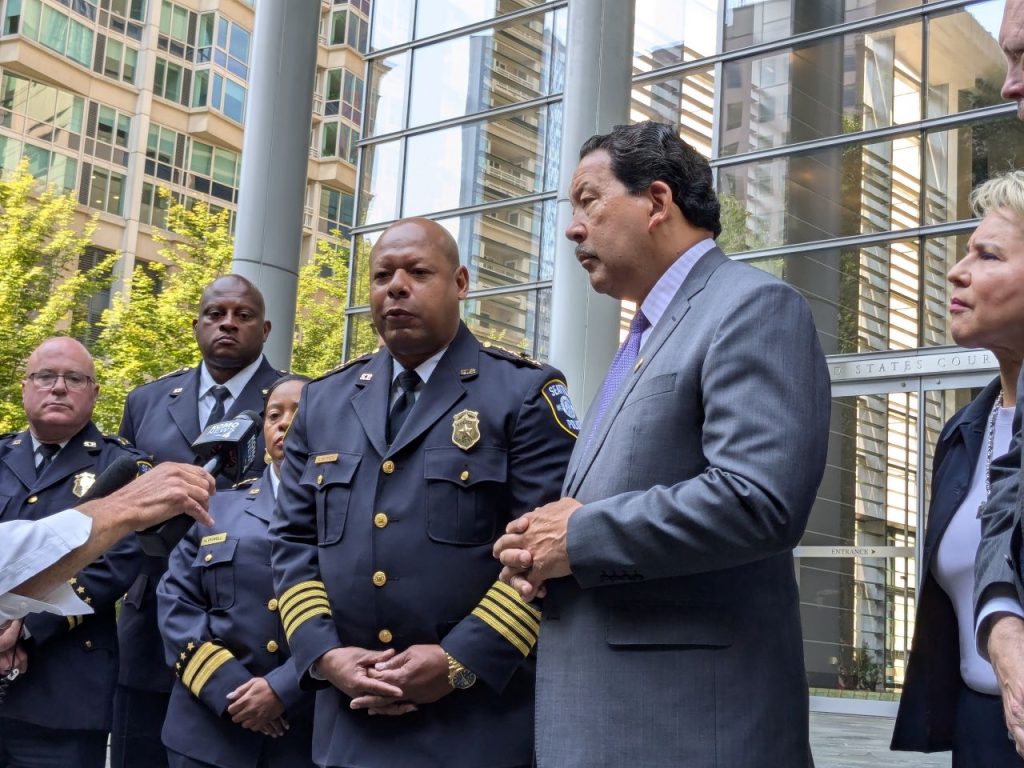
At noon Thursday, Mayor Bruce Harrell conceded the election to progressive challenger Katie Wilson, surrounded by supporters, cabinet members, and colleagues in the lobby of Seattle City Hall. Harrell vacillated between a conciliatory tone that extended an olive branch to his successor and a few defiant moments when he seemed to pick up campaign attack lines once more.
The departing mayor said he had no regrets and would not have done anything differently than he did, even as he alluded to his campaign’s difficulty resonating with younger voters, who broke sharply for his opponent.
Wilson co-founded and led the Transit Riders Union, a grassroots advocacy group that has fought to reduce transit fares, expand tenant protections, and raise the minimum wage in a number of Puget Sound cities. That appeared to give her credibility on affordability issues that many Seattleites are grappling with, but especially younger folks.
“The Wilson administration will have new ideas. You will have a new vision,” Harrell said. “By winning the election, they have earned that right. We must listen to the young voters. We realize that when I had won in 2021 to this current election, there were 12,000 more ballots of people who voted, new people with new ideas. There were over 50,000 new registered voters.”
Seattle Mayor Bruce Harrell just conceded to progressive challenger Katie Wilson at a ceremony at City Hall. Wilson won by about 2,000 votes in a close race.
— The Urbanist (@theurbanist.org) November 13, 2025 at 12:18 PM
[image or embed]
Wilson won 50.2% of the vote, opening up a 0.73-point lead as of November 13, with nearly all ballots tallied. She trailed by seven points on election night, when about 42% of ballots were counted, but closed the gap in later results, which tend to trend toward progressives in every Seattle election. It was a close race, but her lead has grown just beyond the machine recount threshold.
After a half-hour speech, Harrell took questions from reporters. Asked if he might be conceding too soon, Harrell briefly elevated concerns making the rounds in conservative circles that there were “anomalies” in the election results and that turnout was unexpectedly high. However, he still landed on conceding being the right decision, ultimately.
“So to be candid with you, Sebastian, a lot of people were saying that I shouldn’t concede and that there were anomalies, differences,” Harrell said. “This is an incredibly high voter turnout, and it was unexpected, these numbers. But I looked at the numbers, thought it was appropriate to concede, and I’ll let others worry about that. I wanted to bring to my cabinet some closure.”
One area where Harrell didn’t offer closure, though, was on an end to his political career. He left that door open.
“What we’re going to do is we’re going to take a little time, put things in prayer, and we’ll make some decisions,” Harrell said. “So I haven’t excluded anything.”

Harrell hinted that a harder line against Trump was part of Wilson’s appeal with younger voters. Harrell ramped up rhetoric against Trump late in the campaign, but early in the year took a collaborative tone, saying he was “not going to D.C. with my fist balled” and praising Trump’s inner circle of tech billionaires.
“The young people believe their voices are not being heard,” Harrell said. “They’re seeing due process violated. They’re seeing a throwback in history of this country that we love, a throwback into racism and unfairness. We have to listen to these young voices. While it is very seductive to stay in campaign mode and look at the Wilson administration from a competitive lens, I will not do that.”
Ultimately, Harrell argued he shared the same core values with Wilson.
“I believe in our hearts, but they want the same thing, fairness, justice, peace, equity, equality,” Harrell added. “They’re going to fight for safety. Their administration will fight for educational opportunities. They will fight for environmental sustainability. And I pray that they’re fighting with love, if there’s one legacy that I want to leave, that I try to lead with love.”
Harrell added that it fit into his One Seattle theme, a signature branding effort of his term, while appearing to grant the concept was so broad as to be often misunderstood.
“I say this loudly for the Wilson administration,” Harrell said. “We may have different tactics on how to get there, but I believe our core values are the same. And I cannot say that in other states. I cannot say that in other cities. I can say that for someone just born eight blocks from here, I can say that about the city of Seattle: that you care about these things, and that is the ‘One Seattle’ concept. I know people wanted to know where was I going with this concept? It’s going to the concept that above all else, we will focus on what we have in common. We cannot be defined by our differences. We can celebrate our differences only toward the path toward commonality.”
When asked which policies he’d most like to see the Wilson administration carry forward, Harrell said education, economic development, and public safety. On the job creation front, he praised the work of his Markham McIntyre, the former Seattle Metropolitan Chamber of Commerce vice president that he hired to lead the Seattle Office of Economic Development.
“They say, well, he likes business. I like jobs is what I like,” Harrell said. “I like, whether it’s the CEO or the janitor or everyone in between. We need those jobs here in Seattle. We have to realize that we cannot take economic development for granted. And I want to give a special shout out to Markham McIntyre, who’s been absolutely phenomenal.”
Pointing to figures showing Seattle hired 150 officers this year, Harrell said he was proud of his efforts to stabilize the Seattle Police Department, which lost hundreds of officers and struggled with a labor shortage earlier in his term.
“The reason why we ran on a public safety platform isn’t because we want cops everywhere,” Harrell said.” You know, Boston, I think their ratio is like 3 to 1000. The ratio I was shooting for is 1.9 to 1000. We try to calibrate. Look at best practice what makes sense in the city, but I want everyone to feel safe, even the person that can be harming themselves. I want them to get help; they’re killing themselves with drugs. I want people committing crime and threatening others to be arrested. It’s as simple as that. Politics get very simple when you boil it down to the basics.”
Harrell negotiated two police labor contracts during his term, which together will amount to a 42% raise for police officers over five years — at least once the recently struck deal is approved by city council. Given council support, that appears likely over the lame duck period before Wilson takes over. The labor contracts largely punted on the issue of ratcheting up police accountability measures and expanding the scope of work for the Community Assisted Response and Engagement (CARE) department, which launched as a pilot program seeking to civilianize more tasks assigned to cops.

While Harrell heaped praise on most of his department heads and cabinet members, one person absent from the speech and the city hall lobby steps was his police chief, Shon Barnes. Harrell installed Barnes earlier this year after ousting his first pick to lead the department, Adrian Diaz, amid numerous scandals three years into his term. While Diaz was an internal hire, Barnes came from Madison, Wisconsin, where he served as police chief.
Harrell did take offense to one question that a KIRO reporter asked: “Do you think you adequately understand understood how much people were struggling with affordability in Seattle, that’s one of the most expensive cities in the country.”
Rather than simply saying something along the lines of: ‘yes I get it; many Seattleites are struggling, and we have to do more to help them,’ the mayor took it personally.
“By the way, we work very, very hard. I’ve got to put that out,” Harrell said. “To some extent, it’s almost an offensive question. Let me tell you why, because you don’t know the scars that I had worked with a mom and dad who did not go to college. You don’t know the scars I had when I said when I was in high school, one reason why I worked so hard to get an athletic scholarship as a football player is because I knew my mom and dad couldn’t afford to send me to college.”
Harrell added that he “spent an inordinate amount of time in neighborhoods talking to poor people” and noted his wife was the CEO of United Way, a nonprofit focused on uplifting the poor. “We have dedicated our life to helping poor people, because that was us,” he said.
Left unspoken was the life of comfort that Harrell has lived for the last three decades as a wealthy attorney married to a successful executive. At his last disclosure, Harrell’s net worth was north of $15 million.
That wealth didn’t stop Harrell from hitting his opponent for allegedly being spoiled and entitled. In a desperate gambit in the final days of the election, Harrell attacked Wilson for accepting financial help from her parents to help cover child care expenses during her mayoral campaign. His campaign insinuated she had been living off her parents’ money for much of her life, which was unsubstantiated and incorrect.
And rather than talking about structural changes that he was able to achieve in his 16 years in elected office, Harrell focused on charity and mentorship work in his response.
“It could be because people were trying to attack us and say we didn’t get it, but we get it, and we will continue to get it,” Harrell said. “We spent an inordinate amount of time in communities, both donating money, mentoring people, talking to people about how to be better, because Joanne and I, we could have been statistics. Our paths to being the first lady and the mayor were not easy. So, yes, I think that we understand the plight.”
Ultimately, voters went with a candidate who has lived their struggle and fought for structural solutions in recent memory, rather than in a different millennium.
Disclosure: I serve on The Urbanist Election Committee, which endorsed Katie Wilson.
Doug Trumm is publisher of The Urbanist. An Urbanist writer since 2015, he dreams of pedestrian streets, bus lanes, and a mass-timber building spree to end our housing crisis. He graduated from the Evans School of Public Policy and Governance at the University of Washington in 2019. He lives in Seattle's Fremont neighborhood and loves to explore the city by foot and by bike.



